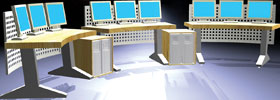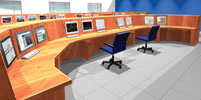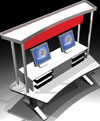

While concern remains high in the security industry and elsewhere that control room equipment be sophisticated and cost-effective, far less importance is given, and attention paid, to the conditions under which that equipment will be used.
Yet whether the control room is used for surveillance, for production control or is a call centre, the practical value of its equipment depends on the ability of operators to maintain unfailing concentration throughout their shifts. Ambient conditions are important in determining whether such a challenge is fully met.
Heading the list of those conditions is the workstation. Occupying its centre is the console, which must be ergonomically sound in terms of its height and depth. Those dimensions can vary from job to job. Indeed, each console has to be tailor-made, taking account of who will be using it (wheelchair-bound operators, for example, will need a lower than normal desk top) and how much hardware it will have to accommodate.
Adequate investment must also be made in chairs. Subjected to shifting weight for many hours, they must be fully adjustable and of robust construction, especially if each is used at a workstation manned by several operators over a 24-hour period.

Trying to save money by investing in cheap materials and construction methods for workstations will prove to be misguided, especially in 24/7 control rooms. Wear and tear will soon see consoles and chairs having to be replaced, which involves further financial outlay and, even worse, will mean interrupting the operation of the control room while new consoles are installed.
The operator's working environment extends, of course, beyond the console. Important factors in it include lighting, airconditioning, the positioning of screens (height and distance in relation to the operator) and ready access to refreshment and toilet facilities. Not so obvious is the need for quiet, providing which may require sound-proofed booths.

Because every control room presents some unique requirement, experience is invaluable in producing solutions that are effective and cost-efficient. That applies to consoles as much as it does to electronic hardware.
But even highly experienced and talented designers need time to produce good results. Instead of calling at the last moment for a quote for consoles to accommodate a certain amount of hardware, companies tendering to supply the latter should involve the designer at the planning stage. This way, more information will be gained by the designer, leading to a better product and a more accurately calculated price for it. If a presentation drawing is also produced, it can be added to the tender document to aid the client in visualising the end result.

Before deciding which console-manufacturing company to commission for a new installation, evidence should be obtained of previous successful installations. The skills and experience they demonstrate should, of course, have been retained by the company. That means ascertaining that the people who produced those installations still work for the company.
Being a successful supplier of consoles requires more than designing them for efficient operation. They must also be easily transported and installed. No less importantly, the supplier must have proved that it unfailingly meets its scheduling commitments; it is costly to have hardware sitting around waiting for consoles to be delivered. The supplier must, in short, have demonstrated in previous contracts that it has not only efficient design capability but also adequate production capacity that is soundly managed.
Hardware suppliers will sometimes require a console-manufacturing company to oversee all aspects of creating a control room - that is, to sub-contract work to lighting, airconditioning and perhaps plumbing firms. Again, before handing over that responsibility the hardware supplier should obtain evidence that the console manufacturer has project-management competence.
To sum up, when choosing who to commission for hardware furniture, the wisest nod goes to the firm that possesses proven design, manufacturing and installation skills and many years experience in exercising them.
Penny Bond is the CEO of Progroup Manufacturing.
| Tel: | +27 11 493 1545 |
| Email: | [email protected] |
| www: | www.progroupsecure.co.za |
| Articles: | More information and articles about Progroup |

© Technews Publishing (Pty) Ltd. | All Rights Reserved.